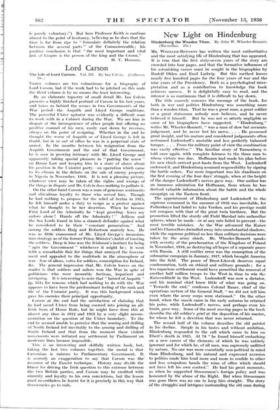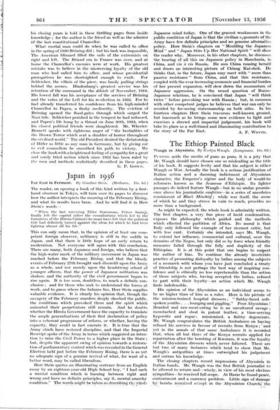New Light on Hindenburg .
Ma. WHEELER-BENNETT has written the most authoritative and the most satisfying life of Hindenburg Mid has appeared. It is true that the first sixty-seven years of the story are crowded into four pages, and that the formative influences of his astonishing career must be sought in the biographies by Rudolf Olden and Emil Ludwig. But this method leaves nearly five hundred pages for the four years of war and the nine years of the Presidency. Both as a psychological inter- pretation and as a contribution to knowledge the book achieves success. It is delightfully easy to read, and the interest is so continuous that it is. difficult to lay down.
The title scarcely conveys the message of the book, for both in war and politics Hindenburg was something more than a wooden titan. That he was a great man, a great soldier or a great statesman nobody now believes, and he never believed it himself. But he was not so utterly negligible as some of his biographers have suggested. " Hindenburg," writes Mr. Wheeler-Bennett, " was a man of slow but accurate judgement, and he never lost his nerve. . . . He possessed great insight, and his mature and considered judgements often restrained Ludendorff's unstable and less perfectly balanced temper. . . . From the military point of view the combination was vastly effective." The familiar story of Tannenberg is told once again, with complete fairness to the three men to whom victory was due. Hoffmann had made his plan before his new chiefs arrived post-haste from the West. Ludendorff endorsed it, and Hindenburg assumed responsibility by signing the battle orders. Far more important was his steadiness on the first evening of the four days' struggle, when at the height of the danger Ludendorff's nerves gave way. Our author has an immense admiration for Hoffmann, from whom he has derived valuable information about the battle and the whole campaign on the Eastern front.
The appointment of Hindenburg and Ludendorff to the supreme command in the summer of 1916 was inevitable, for Falkenhayn had failed to take Verdun, and his prestige could not compare with that of the great twin brethren. But the promotion lifted the sturdy old Field Marshal into unfamiliar spheres, where he made—or at any rate failed to prevent—the most terrible mistakes. As the War advanced the Kaiser and his Chancellors dwindled away into unsubstantial shadows, while the supreme political no less than military decisions were taken by the army chiefs. Mr. Wheeler-Bennett speaks with severity of the proclamation of the Kingdom of Poland in November, 1916, as destroying all hopes of a separate peace with Russia. A still costlier error was the resumption of the submarine campaign in January, 1917, which brought America into the field. The peace of Brest-Litovsk deserves equal condemnation, both on ethical and military grounds ; for a less rapacious settlement would have permitted the removal of another half million troops to the West in time to win the Kaiserschlacht in the West. Ludendorff was now a dictator, and his nominal chief knew little of what was going on. " Towards the end," confesses Colonel Bauer, chief of the operations section of the General Staff, " we did not tell him even where the army corps were stationed." On the other hand, when the smash came in the early autumn he retained his poise, while Ludendorff's nerves, and perhaps even his brain, gave way. Some of the most moving pages in the book describe the old soldier's grief at the deposition of his master, for whom he felt a deVotion that was never returned.
The second half of the volume describes • the old patriot in his decline. Simple in his tastes and without ambition, Hindenburg responded to the call which came to him on Ebert's death in 1925. At 78 " he found himself embarking on a new career of the elements of which he was entirely ignorant and for which he, of all men, was supremely unfitted by nature. No one was more essentially non-political in mind than Hindenburg, and his natural and expressed aversion to politics made him tend more and more to confide to other and less scrupulous hands the reins of office which should not have left his own control." He had his great moments, as when he supported Stresemann's foreign policy and Was honoured by the abuse of the Right. But when Stresemanii was gone there was, no one to keep him straight. The story Of the StrifigleS'iiial intilgues-surfoanding the old man during
his dosing years is told in these thrilling pages from inside knowledge ; for the author is the friend as well as the admirer of the last constitutional Chancellor.
What mortal man could do when he was called to office in the spring of 1930 Bifining did ; bid his task was impossible, The American blizzard filled the sails of the extremists on right and left. The Briand era in France was over, and at home the Chancellor's enemies were at work. His greatest mistake was to believe in the unswerving_ loyalty of the old man who had called him to office, and whose presidential prerogatives he was shortsighted enough to exalt. For Schleicher, the villain of the piece, was busily pulling strings behind the scenes. Hindenburg's -greatest service was his retention of the command in the Winkle of November, 1918: His lowest fall was his acceptance of the services of Shining and the votes of the Left for his re-election in 1932. For he had already transferred his confidence from his high-minded Chancellor to Papen, a flashy mediocrity. The eviction of Bruning opened the flood-gates through which surged the Nazi tide. Schleicher perished in the tempest he had unloosed, and Papen's life hung by a thread on June 30th, 1934, when his closest political friends were slaughtered. Mr. Wheeler- Bennett speaks with righteous anger of " the bestialities of the Brown Terror which sent a shudder of horror throughout the civilised world." The old President desired the dictatorship of Hitler as little as any man in Germany, but by giving ear to evil counsellors he smoothed his path to victory. We close the book with a heightened feeling of sympathy for a great and sorely tried- nation which since 1932 has been ruled by the men and methods realistically described in these pages.
G. P. Goocit.















































 Previous page
Previous page